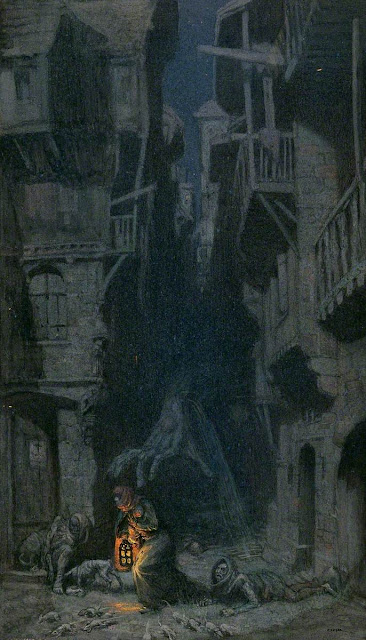The New Normal, Solitude, Reading and Mental Health
The New Normal
 |
A Giant Hand Roaming Through the Dark Streets of London
Richard Tennant Cooper (1885-1957)
Photo Credit: Wellcome Collection [ CC BY]
|
Same goes for your witless variations on "keep calm and carry on". None of them is funny! None of them is interesting. I wish you would all keep **** and **** off. And stop observing how all the people are complaining about people in the park are in the park.
And as for all your tweets about how "alert" you are, they can get bent, as well. If everyone is making the same joke, it means it isn't funny, capiche?
A joke is, by definition, a different way of looking at something. And yet thousands, literally thousands of twitterers spent Sunday offering their own entirely unhilarious variations on the government's moronic motto, which is itself based on the misconception that a cliché can set something in people's minds when in fact, clichés cause human minds to close down and think about something else. Like sex, mostly. Or cheese.
At least they got rid of that other cliché, though, that poisoned the first six weeks of lockdown for everyone. Because every time I heard some government goon end his thin peroration with "stay home, protect the NHS, save lives", I swear to God it made me want to set light to a key worker.
(Giles Coren, The Times, 2020)
Oh Giles, is the virus affecting your sense of humour?
Solitude
 |
| Seaside Solitude, Samuel Phillips Jackson (1830-1904) Photo Credit: Royal Watercolour Society [Public Domain] |
Every time I go online I encounter yet more panic about how lockdown is going to drive us all mad. Depression apparently lurks in solitude and we need to take unbelievable care of ourselves if we hope to emerge from all this with any sanity or wellbeing intact. But solitude and loneliness are two very different things: the first example of the use of the word solitude given on my pre-pandemic online dictionary is "she savoured her hours of freedom and solitude". That does not sound too bad.
What has happened to Wordsworth's "bliss of solitude"? To the cheerful, sane humour of the third-century desert hermits? To individuals like Bernard Moitessier, the solo yachtsman who, rounding Cape Horn in a strong position to win the first Golden Globe race in 1968, decided it would be more fun to sail on, back round the Cape of Good Hope a second time and into the Pacific again; or Tenzin Palmo, the UK-born Buddhist nun, who spent 12 years alone in a cave in the Himalayas? Why should being alone undermine mental health, wellbeing and contentment?
… What if, instead of a huge disadvantage, being alone were framed as an opportunity for developing the self? Solitude seems to be more or less a necessity for creativity, for instance, whether it is drawing, painting, writing, learning an instrument, cooking or any other kind of creative activity. It is also very useful for anyone wanting to deepen their spirituality - this is why both Christians and Buddhists encourage retreats: periods of chosen isolation and usually silence.
… Loneliness is a negative, sad feeling. Solitude on the other hand is bliss. And practice makes perfect. So practice.
(Sara Maitland, The Observer, 2020)
Thank you Sara for some common sense.
Reading and Mental Health
… I know that reading does wonders for my mental health, and there is some body of research suggesting that it does so for others too. I remember feeling giddy when reading War and Peace for the first time last year and rereading Moby Dick. I don't think it has anything to do with the subject matter - I remember rereading both Anna Karenina and Madame Bovary in the last year or so and thinking to myself how utterly grateful I was to have been born after Tolstoy and Flaubert, that these books were here to accompany me on my passage through this life. Both are hardly "happy" or "relaxing" stories, but the language and the richness of the characters literally made me feel more alive.
(Daniel Mason, The Observer, 2020)
Thank God there are still some people who read for pleasure rather than stare at screens for much of the time.
Reading and Mental Health
 |
The Reader, Alfred Emile Leopold Joseph Victor Stevens (1823-1906)
Photo Credit: The Fitzwilliam Museum [CC BY-NC-ND)
|
(Daniel Mason, The Observer, 2020)
Thank God there are still some people who read for pleasure rather than stare at screens for much of the time.
Comments
Post a Comment